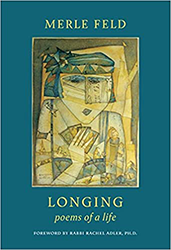In the introduction to her new collection, Longing: Poems of a Life, Merle Feld writes, “If we’ve been subject to violence, it may remain for most of us unexamined, closeted. My decision in this collection has been to open the closet, to expose old pain and festering wounds to fresh air as part of the process of healing.” Indeed, the book explores the ways that the speaker’s father’s physical abuse affected the family — their relationships with each other and with future spouses and children. Through the lens of both her six-year-old self and her current, empathic one, Feld looks back at some of the most traumatic moments of her childhood as she tries to understand her mother’s lack of response.
This collection, which is narrative in style, is an accessible yet painful reflection. Each section opens a door to a specific time period and moves mostly chronologically. Feld portrays herself as a witness and describes herself and her siblings as similar to the four children mentioned in the Passover Haggadah. “I am a simple child with many questions,” she writes in her poem, “Seder story.” But the young speaker is never able to ask her questions out loud. She feels simultaneously unsafe and invisible to parents who express little concern for her emotions or well-being.
As the speaker goes through puberty, she finds more reasons to feel unsafe. Her excitement about being allowed to do more grown-up things, like go to the grocery store alone, ultimately fizzles when she is harassed and given unwanted sexual attention.
But then she falls in love with her future husband, and all the negativity of her childhood seems to fade. In the poem “Shabbos together,” Feld writes about their first Shabbat dinner: how they ate at a “secondhand chrome table,” which was “so ugly that we turned out / the lights.” Her joy in this moment is so strong that the speaker cries, “Oh God, you have been so good to me! / Finally, for the first time in my life, / you gave me something I wanted.” She recognizes, though, that the “darkness of childhood wounds” haunts her relationship. She and her husband must work through their problems in order to have a different relationship than her parents’.
Feld’s poems communicate the pain of a miscarriage, the joy of the birth of her children, the awe and confusion of early motherhood, and the difficult experience of caring for one’s aging parents. In the poem, “What he knew, day two,” the speaker has a realization at her dying mother’s bedside. She believes that during her childhood, her mother
… didn’t know
how to stop giving love — against her nature.
But then, these last years, alone together
sunny Florida, she seemed finally to see him
with clarity, finally to see the selfishness,
his profoundly crippled soul. I suspect
in the end, she didn’t want him, and he knew.
This is a turning point for the speaker, but also for her mother, who finally observes that abusive relationships are not to be tolerated. In the Foreword to this collection, Rabbi Rachel Adler notes that Merle Feld “ … joins with other Jewish feminists in our mission to reenvision and inhabit a world in which patriarchy has been transcended.”
Jamie Wendt is the author of the poetry collection Laughing in Yiddish (Broadstone Books, 2025), which was a finalist for the 2022 Philip Levine Prize in Poetry. Her first book, Fruit of the Earth (Main Street Rag, 2018), won the 2019 National Federation of Press Women Book Award in Poetry. Her poems and essays have been published in various literary journals and anthologies, including Feminine Rising, Catamaran, Lilith, Jet Fuel Review, the Forward, Minyan Magazine, and others. She contributes book reviews to the Jewish Book Council. She won third prize in the 2024 Reuben Rose Poetry Competition and won second prize for the 2024 Holloway Free Verse Award through the Illinois State Poetry Society. Wendt holds an MFA in Creative Writing from the University of Nebraska Omaha. She lives in Chicago with her husband and two kids. Follow her online at https://jamie-wendt.com/ or on Instagram @jamiewendtpoet.


